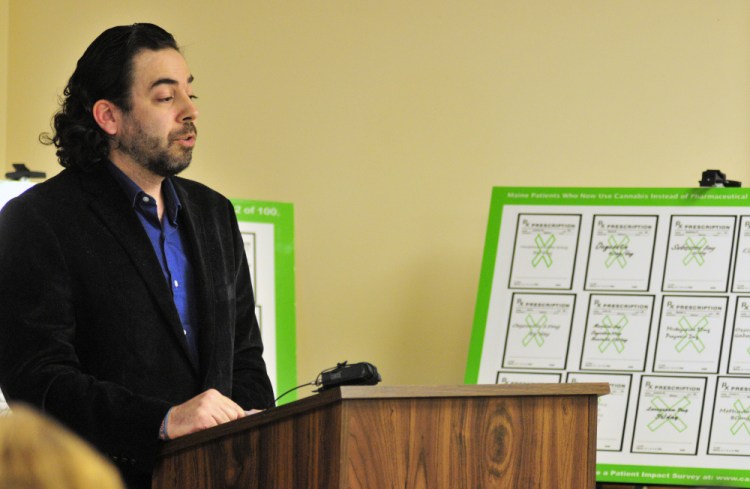A leading opponent of marijuana legalization in Maine said Tuesday he has formed a new coalition to try to defeat the initiative in November, although he would not identify any of the group’s members and said its leadership is still taking shape.
Mainers Protecting Our Youth and Communities includes parents, youth, health experts, faith leaders, law enforcement and public health advocates, according to Scott Gagnon, spokesman for the group. Gagnon also is chairman of Smart Approaches to Marijuana Maine, which has opposed legalization at the local and state levels.
Gagnon said he was not naming any of the other individuals or groups involved in the coalition because a steering committee is still being formed. He said more details about the coalition will be released in the near future.
Gagnon said the group is working to identify and recruit volunteers to serve as county captains as it focuses and localizes its efforts to fight the legalization initiative. He said coalition members have a number of concerns about the initiative, including the impact on youth, employers and communities.
“This initiative to legalize marijuana poses significant threats to our youth and communities,” Gagnon said in a prepared statement. “The marijuana industry has crafted an initiative that would see shops opened in neighborhoods all over Maine, selling potent pot gummy bears and cookies, and other highly addictive and dangerous products. These products have (led) to increases in ER admissions in Colorado, including admissions of preschool-aged children.”
The legalization campaign also is likely to face opposition from some medical marijuana growers and patients who fear the referendum will put marijuana in the hands of big business and destroy the local industry that has sprung up around medicinal uses of cannabis. A small contingent of growers and patients protested in Augusta when legalization supporters turned ballot petitions in to the Secretary of State’s Office on Feb. 1.
The path to the ballot was a bit bumpy for the Campaign to Regulate Marijuana Like Alcohol, which collected roughly 100,000 petition signatures in its effort to qualify for the November ballot. Secretary of State Matt Dunlap invalidated nearly half of those signatures for various reasons, including inconsistencies between the notary signatures on file with the state and those on petition sheets. A state court later ordered Dunlap’s office to review the signatures again.
Dunlap later determined that the Campaign to Regulate Marijuana Like Alcohol had gathered more than the 61,123 petition signatures from registered Maine voters needed to qualify for the ballot.
The legalization proposal headed for the November ballot would allow adults to possess up to 2½ ounces of marijuana and to cultivate a limited number of plants. Retail stores and social clubs would be allowed with state and municipal approval. Adults would be prohibited from using marijuana in public, with violations punishable by a $100 fine. The bill also would place a sales tax of 10 percent on retail marijuana and marijuana products.
David Boyer, campaign manager for the Campaign to Regulate Marijuana Like Alcohol, said he is not surprised that Gagnon put together a group to oppose the initiative.
“It’s unfortunate that they’re already bringing out scare tactics and wild exaggerations,” Boyer said. “It’s unfortunate that when (Gagnon) talks about having a science-based discussion, they’re using Reefer Madness 2.0 to stretch the truth.”
In his announcement about the coalition, Gagnon said members are concerned about youth access to marijuana edibles, which Gagnon says could be marketed to children. Boyer said the initiative contains specific language that prevents marijuana from being advertised to children and requires that edibles be sold in child-proof packaging.
If Maine were to legalize recreational marijuana, it would join Colorado, Washington, Oregon, Alaska and Washington, D.C., in allowing adults to buy and possess the drug. All have passed laws legalizing recreational marijuana despite a federal prohibition.
California, Nevada, Arizona and Massachusetts are among the states that will consider marijuana legalization in 2016.
In 2014, supporters of legal marijuana in Maine pushed to get the issue on municipal ballots. South Portland voters joined Portland in approving an ordinance to support legalization, while residents in Lewiston soundly rejected the idea. Portland voters had approved a similar ordinance in 2013.
Those votes to allow adults to possess marijuana were seen largely as symbolic because marijuana remains illegal under state and federal law.
Gagnon said Mainers Protecting Our Youth and Communities plans to launch a website and social media sites soon. He said the coalition also will start fundraising, but expects that it will not be able to raise as much money as the pro-legalization campaign.
“We know there are a lot of concerned Mainers out there who may be able to contribute a little bit,” he said. “There will be a lot of fundraising in our future.”
Gillian Graham can be contacted at 791-6315 or at:
Twitter: grahamgillian
Copy the Story LinkSend questions/comments to the editors.




Success. Please wait for the page to reload. If the page does not reload within 5 seconds, please refresh the page.
Enter your email and password to access comments.
Hi, to comment on stories you must . This profile is in addition to your subscription and website login.
Already have a commenting profile? .
Invalid username/password.
Please check your email to confirm and complete your registration.
Only subscribers are eligible to post comments. Please subscribe or login first for digital access. Here’s why.
Use the form below to reset your password. When you've submitted your account email, we will send an email with a reset code.